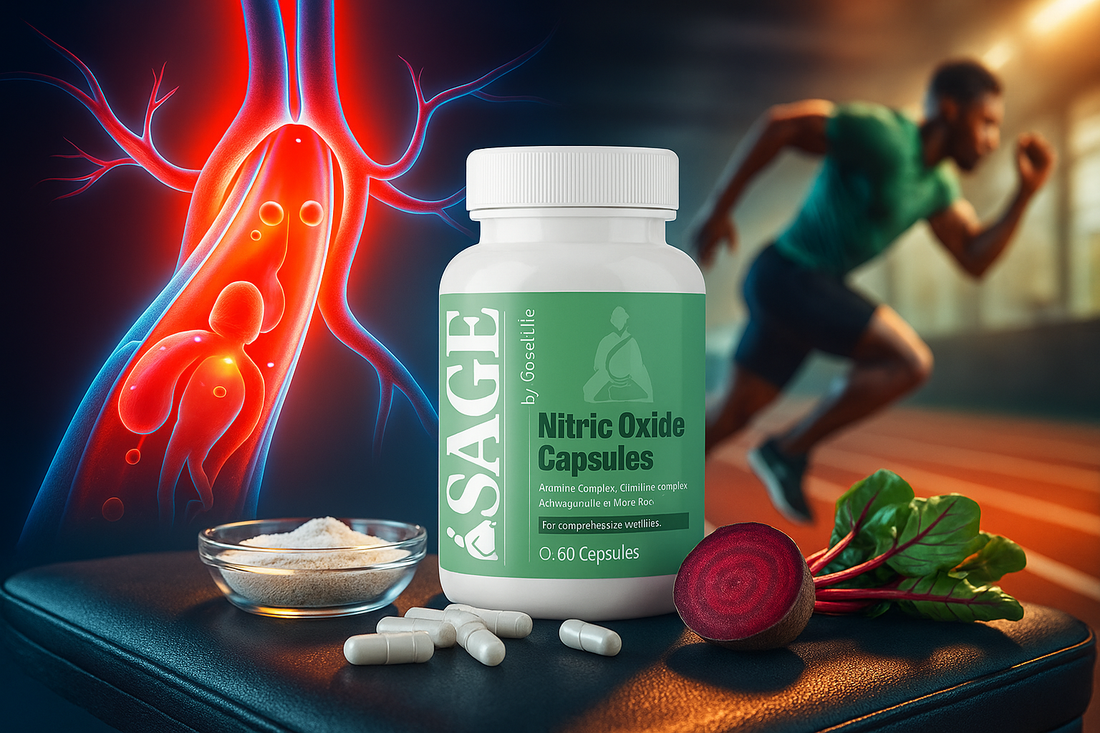
The Science Behind Nitric Oxide Supplementation for Performance
Share
In the search for greater athletic prowess, faster recovery, and peak endurance, nitric oxide (NO) supplementation has taken center stage among athletes and wellness enthusiasts alike. But what exactly is nitric oxide, how does it work in the body, and why has it become such a pivotal topic in exercise science? In this deep dive, we’ll explore the biochemistry, mechanisms, performance benefits, and scientific evidence underpinning nitric oxide supplementation.
What Is Nitric Oxide?
Nitric oxide is a small, naturally occurring molecule produced in the body, functioning as a powerful signaling molecule. Its main job is to relax and widen blood vessels (vasodilation), improving the flow of blood throughout the body. While NO is produced all over our bodies, it is especially crucial inside the endothelium, the inner lining of blood vessels where it helps control blood pressure, blood flow, and oxygen delivery to muscles and organs.
How Is Nitric Oxide Produced?
- Endogenous Pathways: Nitric oxide is synthesized primarily from the amino acid L-arginine through the action of nitric oxide synthase (NOS) enzymes.
- Dietary Pathways: Foods rich in nitrates (such as beets and leafy greens) and supplements (typically containing L-arginine, L-citrulline, or nitrates) can significantly boost nitric oxide levels in the body.
L-citrulline, found in some supplements, raises L-arginine levels, which in turn, increases NO production, often with even greater efficiency than direct L-arginine supplementation.
The Role of Nitric Oxide in Exercise Performance
1. Vasodilation and Blood Flow
When nitric oxide is released, it causes blood vessels to widen and relax. This increases circulation, helping more oxygen and nutrients reach working muscles while also speeding up the removal of waste products like lactic acid. These effects are key not just to athletic performance, but also to recovery.
2. Improved Oxygen Utilization and Exercise Capacity
NO helps regulate how oxygen is delivered and used in bodily tissues. By optimizing oxygen uptake and delivery, NO can reduce the oxygen cost of exercise, enabling athletes to perform at the same work output with less fatigue. This makes workouts more efficient and sustainable.
3. Enhanced Muscle Efficiency and Power Output
NO is linked with:
- Increased muscle contraction velocity
- Greater force production
- Better muscle “pump” due to improved blood flow
It also facilitates mitochondrial function and cellular energy production attributes essential for building muscle and endurance.
4. Accelerated Recovery
By boosting circulation, nitric oxide helps clear exercise-induced metabolic by-products more quickly (such as lactic acid), and delivers repair nutrients to muscles, thereby speeding up recovery.
5. Antioxidant and Immune Functions
NO acts as an antioxidant, scavenging harmful free radicals, and supports immune defense mechanisms, further protecting cells during stressful or intense physical activity.
From Research to Results: What Does Science Say?
- Endurance Athletes: Studies have shown that both acute and chronic nitrate (NO precursor) supplementation can improve endurance performance, race times, and exercise economy (the oxygen cost at a given output). Notably, these effects appear strongest in non-elite or moderately trained individuals, with the benefit in highly trained athletes being variable.
- Strength and Power Athletes: Preliminary research suggests NO precursors may enhance repetitions to failure, muscle efficiency, and perceived effort, although more studies are needed in this area.
- Real World Results: Improvements in time trial performance, increased peak power output, and reduced fatigue are among the main findings reported across several studies. Some sources note a 1-2% improvement in race times and up to 20% longer training tolerance according to controlled trials.
Are There Risks or Side Effects?
For most healthy individuals, nitric oxide supplements (when used as directed) are well tolerated. Mild side effects may include digestive discomfort, headache, or minor heart palpitations. People with cardiovascular disease or those on medications should consult a physician before use, as NO can interact with blood pressure and nitrate-based medications.
The Bottom Line
Nitric oxide supplementation represents one of the most scientifically supported, natural ways to enhance blood flow, optimize oxygen and nutrient delivery, boost endurance, and accelerate muscle recovery. By understanding and leveraging the body’s innate NO pathways whether via targeted nutrition or supplementation-athletes and fitness seekers can unlock new levels of performance and resilience.





